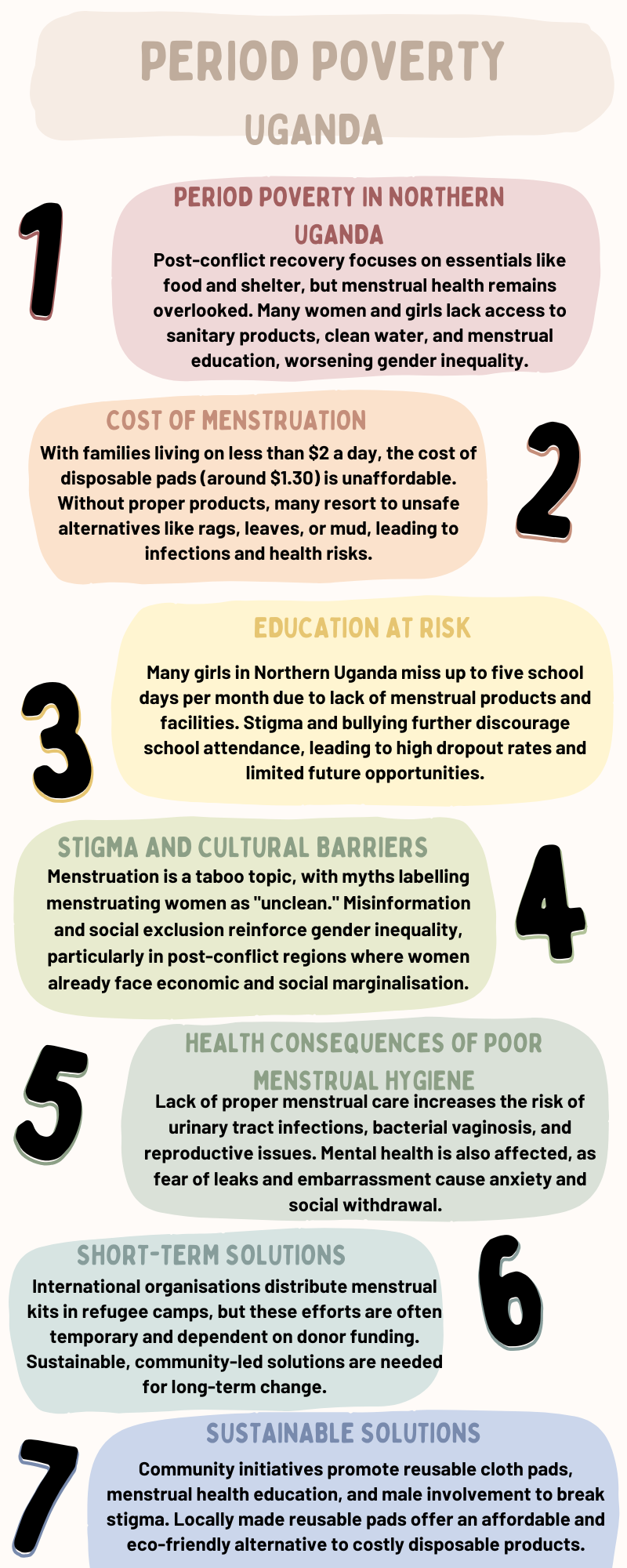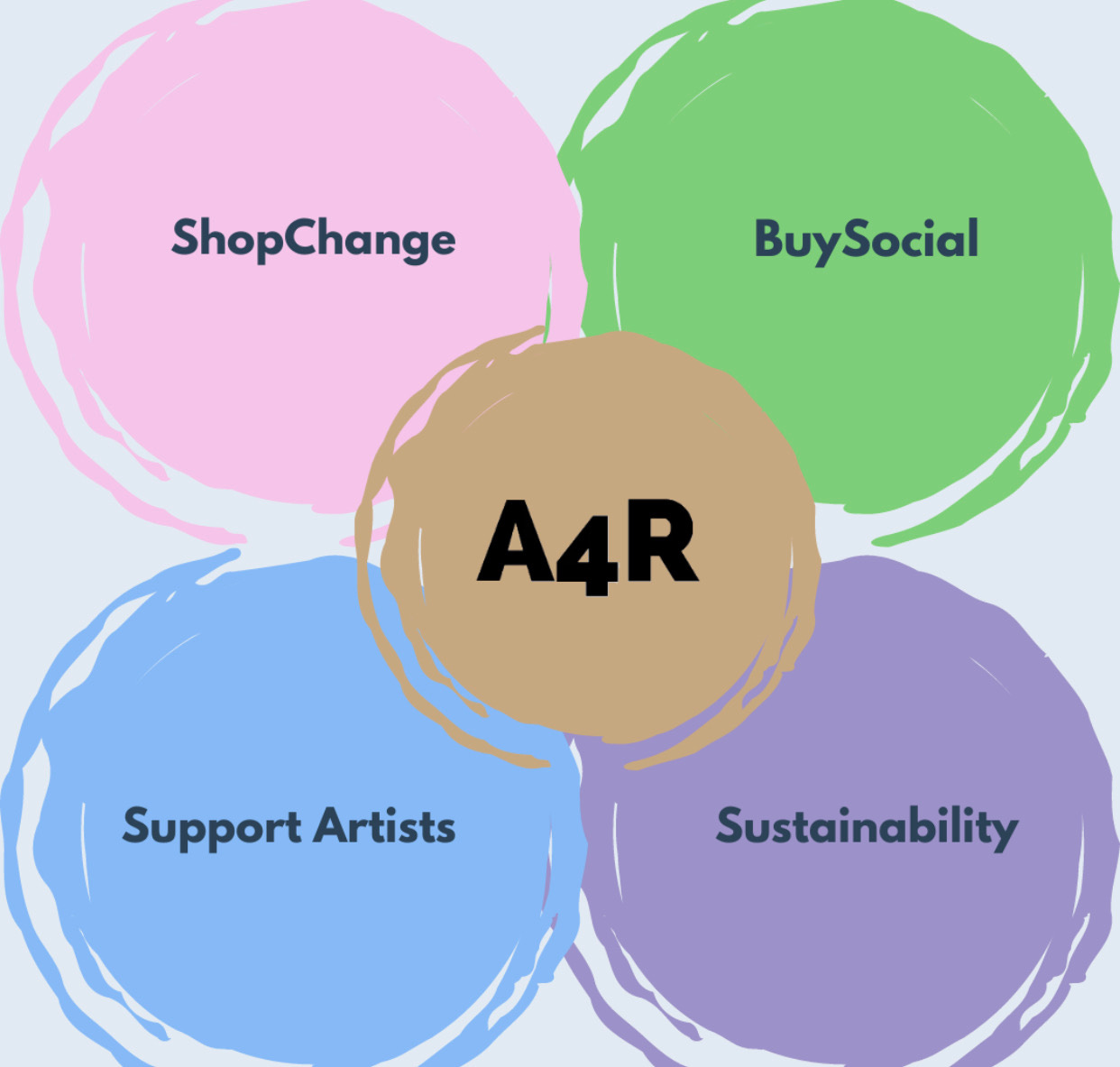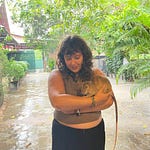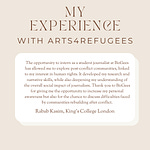Beyond Survival: Addressing Period Poverty in Post-Conflict Northern Uganda
After conflict, rebuilding communities focuses on urgent needs like food, shelter, and security. However, less visible but critical issues such as menstrual health are often neglected. Period poverty—the lack of access to sanitary products, menstrual education, and sanitation, remains a barrier for women and girls in Northern Uganda, particularly in post-conflict communities like Lira. While this issue affects many low-income regions, its consequences are magnified in war-recovering areas, where health services and infrastructure remain inadequate (Maxwell et al., 2014). In Northern Uganda, decades of civil war between the Lord's Resistance Army (LRA) and government forces (1987–2006) displaced millions and devastated local economies. Even after the conflict ended, women and girls in the region face challenges, including gender-based violence, economic marginalisation, and period poverty (Levine & Kirk, 2005). This article explores how post-war poverty, gender inequality, and inadequate menstrual health services intersect to perpetuate period poverty in Northern Uganda, and what measures are being taken to address this issue.
The war in Northern Uganda left communities in extreme poverty, with limited access to employment and education (Levine & Kirk, 2005). For many families, purchasing sanitary products is an unaffordable luxury. A pack of disposable sanitary pads costs around 5,000 Ugandan shillings (approximately $1.30), which is a significant expense in a region where many live on less than $2 a day (Borgen Project, 2023). Without proper menstrual products, women and girls use rags, leaves, or mud, leading to infections and long-term health issues (ODI, 2003). The lack of menstrual hygiene facilities, including clean water and private toilets, exacerbates the problem, making it difficult for girls to manage their periods with dignity (Mokoro, 2012). One of the most severe consequences of period poverty is its impact on girls' education. In Northern Uganda, many girls miss up to five days of school each month due to a lack of sanitary products and clean facilities (Borgen Project, 2023). These absences lead to lower academic performance and increased dropout rates. A 2018 UNICEF report found that nearly one in three Ugandan girls drop out of school due to period-related challenges (Monitor Uganda, 2023). In Lira, teachers report girls feel too ashamed to attend school while menstruating, particularly due to stigma and bullying they experience from peers. This disruption limits girls' opportunities for economic independence, perpetuating cycles of poverty. One study found that girls with access to menstrual hygiene products were nearly twice as likely to stay in school compared to those without, highlighting the critical link between period poverty and educational attainment (ODI, 2003). Menstruation is a taboo topic in many Ugandan communities, including Lira. Many girls lack proper education on menstrual health, leading to misinformation and shame surrounding periods (Maxwell et al., 2014). Some cultural beliefs consider menstruating women "unclean," causing social exclusion and discrimination (Mokoro, 2012). In post-conflict communities where war has reshaped gender norms, women struggle with limited access to land, property, and economic resources (Levine & Kirk, 2005). Period poverty further marginalises them by reinforcing their secondary status to men in education and the workforce.
Unhygienic menstrual materials increase the risk of urinary tract infections (UTIs), bacterial vaginosis, and reproductive health issues. Untreated infections can lead to severe illnesses and infertility. Furthermore, lack of access to proper menstrual hygiene products affects mental health, as anxiety about leaks or odours leads to stress, embarrassment, and withdrawal from social activities (Maxwell et al., 2014). A 2012 study found that many girls in the region lacked basic knowledge about the biology of menstruation, leading to misconceptions and harmful cultural beliefs (Mokoro, 2012). This lack of information not only contributes to stigma, but also puts girls at risk of using unsafe menstrual hygiene practices that can lead to infections and other health problems. International aid organisations and NGOs play a crucial role in addressing period poverty in post-conflict Northern Uganda. Many groups have integrated menstrual health initiatives into broader post-war recovery programs, recognising that access to menstrual hygiene is vital for gender equality and public health. For example, the UN and other humanitarian organisations distribute menstrual hygiene kits alongside food and medical aid in displacement camps (Secure Livelihoods Research Consortium, n.d.). However, these efforts are often short-term and dependent on fluctuating donor funding (ODI, 2003). Sustainable, community-led solutions are necessary for lasting change in menstrual health accessibility and education. Despite these challenges, local organisations and community-led initiatives are combating period poverty in Northern Uganda. Solutions include affordable reusable menstrual products, educational campaigns, and policy advocacy. Many NGOs and social enterprises in Lira have started training women to produce reusable cloth pads from locally available materials due to the high cost of disposable pads (Borgen Project, 2023). These reusable pads, lasting up to two years, offer a sustainable and affordable alternative to disposable products. Some organisations distribute them for free in schools, ensuring girls do not have to miss class due to their periods (Monitor Uganda, 2023).
Grassroots initiatives in Lira have started community-based menstrual health education programs for girls and boys. These programs assist in reducing shame and stigma, educating boys and male teachers about menstrual health, and teaching girls about proper menstrual hygiene and managing their periods safely and confidently (Maxwell et al., 2014). By involving both genders, these initiatives aim to create a more supportive and understanding environment for menstruating girls. At the policy level, advocates in Northern Uganda are pushing for stronger government action to address period poverty, such as the inclusion of menstrual supplies in humanitarian aid programs and the removal of taxes on sanitary products (Monitor Uganda, 2023). While some progress has been made, such as the 2017 tax exemption on pads making them slightly more affordable (Monitor Uganda, 2023), many communities still struggle with distribution and accessibility. Local organisations are advocating for sanitary products to be included in government aid programs, similar to how food and medical supplies are distributed in crisis areas. If implemented correctly, such policies could significantly reduce absenteeism among schoolgirls and improve menstrual health management in post-conflict regions like Lira (ODI, 2003).
Period poverty in post-conflict Northern Uganda is not just a women's health issue—it is a human rights issue. Lack of access to menstrual products and education directly impacts girls' ability to stay in school, participate in the workforce, and lead dignified lives. Addressing this challenge requires a comprehensive approach: expanding access to affordable and sustainable menstrual products, increasing menstrual health education to address stigma and misinformation, and strengthening government policies and international support to incorporate menstrual health into humanitarian aid programs. Without urgent intervention, period poverty will continue to limit the potential of thousands of girls in post-war communities like Lira. By prioritising menstrual health in the region's recovery and development efforts is not only a matter of public health, but also a critical step towards achieving gender equality and breaking the cycle of poverty.
Borgen Project (2023) Period poverty in Uganda. Available at: https://borgenproject.org/period-poverty-in-uganda/
Levine, S. and Kirk, J. (2005) Transition to development: livelihood recovery and the challenges of reintegration in Northern Uganda. United Nations University - World Institute for Development Economics Research. Available at: https://www.wider.unu.edu/sites/default/files/rp2005-47.pdf
Maxwell, D., Mazurana, D. and Wagner, M. (2014) Mind the gap: exploring the needs of girls in post-conflict Northern Uganda. Feinstein International Center. Available at: https://fic.tufts.edu/wp-content/uploads/MindtheGap_BriefingPaper2.pdf
Mokoro Ltd (2012) Gender, land and property rights in post-conflict Northern Uganda. Available at: https://mokoro.co.uk/wp-content/uploads/gender_land_property_rights_postconflict_n_uganda.pdf
ODI (2003) Livelihood recovery in post-conflict Northern Uganda. Available at: https://assets.publishing.service.gov.uk/media/57a08b6e40f0b64974000b4a/ODI-Brief23.pdf
Secure Livelihoods Research Consortium (n.d.) Livelihood recovery in post-conflict Northern Uganda. Available at: https://securelivelihoods.org/wp-content/uploads/Livelihood-recovery-in-post-conflict-northern-Uganda.pdf
The Monitor (2023) Period poverty: The cost of menstruating in rural Uganda. Available at: https://www.monitor.co.ug/uganda/special-reports/period-poverty-the-cost-of-menstruating-in-rural-uganda-4665298
In this episode Nayyab discusses period poverty and how it impacts lives in Uganda. She is a Citizen Journalist with us on a placement organised with War Studies Department, King’s College, London. This article was edited using Lex.page.
Thank you for reading an A4R 🎨 Post. Don’t forget to visit our gift shop here. Every purchase scales our impact and pays our bills.














